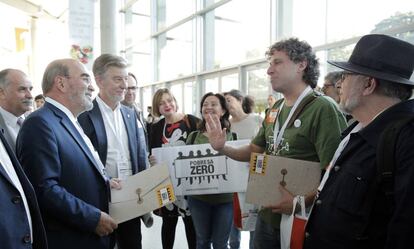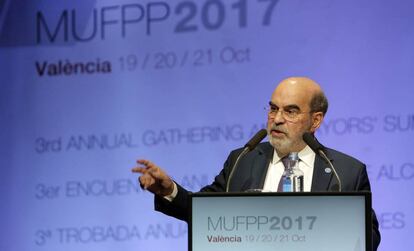“We have outsourced the responsibility for feeding ourselves”
UN’s José Graziano da Silva backs strong public intervention to ensure adequate nutrition for everyone

José Graziano da Silva is convinced that eating fresh, locally-produced food is a powerful weapon against all kinds of malnutrition. And hunger. By generating income for small farmers, it would also help fight the poverty that often causes malnutrition. Despite his busy schedule, the United Nations Food and Agriculture Organization’s (FAO) 67-year-old director-general still makes an effort to find time to cook with his family or to visit the local market in Rome, where the FAO is based.
But last week he was in Valencia, Spain, where mayors from all over the world met to talk about how cities can transform food systems. The challenges posed by hunger, overweight and obesity, and by diets poor in nutrients or saturated by hyper-processed foods are especially acute in urban areas, where more than half of the world's population lives.
Question. Many cities still believe such issues are beyond their remit, which includes maintaining sidewalks and cleaning the streets. Municipal administrations might be reluctant to interfere in the eating habits of residents.

Answer. I believe there must be public intervention in the food distribution system. As for the idea that food is a private decision, I remember when Michelle Obama argued that school lunches, often limited to products like burgers or sodas, should include at least some fruit and vegetables. Many people, from congressmen to journalists, accused her of invading a realm that belonged to mothers and families. She responded by noting that it is the public purse that foots the bill for obesity, related diseases, and the overloading of the health system... It seems obvious that the state must take care of sick people, so why not work on disease prevention? Good nutrition is one way to do this.
Q. At this summit of signatory cities of the Milan Pact there was a lot of talk about raising awareness in schools, but do such campaigns work?
A. If you want to change eating habits, you have to start at the school level. The evaluation at the end of the Obama Administration showed that in cities like New York, the changes were significant: there were fewer overweight children, and also a healthy eating culture was created. Kids no longer ask for so many soft drinks, they eat more fruits and vegetables.
“We must bring the internet to all farmers and fishermen”
Q. Cities are taking giant strides in terms of facing the great challenges of our era, such as the fight against hunger, poverty, climate change, and all the UN Sustainable Development Goals. Are they filling a void no longer covered by the state?
A. I would say that they are trying to integrate the various spaces more effectively. For a long time, we have thought of urban areas as synonymous with development and progress, while rural ones were seen as a symbol of backwardness and poverty. Now it is all about a continuum. And cities, being much more structured than a country or a region, allow for easier and faster planning programs and can prioritize what needs to be done. Our experience is that urban food programs, for example, get results much more quickly than those at the national level, which are more dispersed, have less infrastructure and are more difficult to implement.
Q. But isn’t that gap widening as rural people migrate to cities?
A. In many cases cities are becoming chaotic, polluting and increasingly crowded centers that consume the time of their inhabitants. In a lot of cases, it is almost impossible for many to survive. Why not extend services and infrastructures to integrate rural and urban environments? The New Urban Agenda, approved by the United Nations in Quito (Ecuador), and the agroindustry are fundamental. Making it easier to move from the countryside to the city, for example, would greatly facilitate much of this. And the internet – if we want even one young person to be willing to stay in the countryside, the internet has to arrive. At the FAO we are determined to make our statistics, market prices and weather information available to farmers, and also fishermen, in remote rural areas around the world. In fact, the G7 agriculture ministers were pushing for us to do this at the recent meeting in Bergamo, Italy.
Q. What about those who go to another country in search of a better future?
A. People tend to think of migration only as Africans who survive the Sahara and the Mediterranean to reach Europe. They do not think about the rural-urban migration that is filling cities. Yet without ordering these movements, which are the first link in the chain, we will not be able to regulate international migration.
Q. What is the FAO's approach in this regard?
A. The FAO has a big problem, and it’s the same that almost everyone has today. We are constantly asked to do more, but our budget remains the same. In fact, it's practically the same as it was when I arrived in 2012. That forces us to prioritize, so we cannot continue doing everything. We are convinced that urban-rural integration has to be a priority. And so we must support cities with tools such as the Milan Pact. We will need resources and support, and we have are very hopeful that countries like Spain can once again become major contributors to the FAO.
Q. In addition to raising awareness, administrations can design the school menus.
A. Yes, and here cities have a lot of responsibility, because in most countries they are in charge of primary schools, as well as of other centers such as hospitals. Municipal administrations buy a lot of food, so why don’t they opt for products from the area instead of making a global request for tender looking only for the lowest possible price? That way, in addition to obtaining fresh food, they can give a boost to farmers, ranchers or fishermen in or near the city.
Q. There is much talk about the benefits of consuming fresh produce, and of food miles and organic products. But the truth is that the prices for these are higher, and many people argue they can not afford them.
A. This is generally a question of scale. The large-scale production of the food industry allows for lower prices, while smaller producers have a hard time taking their eggs to the city, and have to charge more. But as Valencia has shown, town halls can open markets for farmers and establish channels so that they themselves, in an organized way, can market their production, and this will allow for more volume and lower prices. You can support these activities with tax breaks, logistical aid or with sanitary inspections support. It can be done - indeed it has been done in many places.
Q. But in the meantime, healthier food is still more expensive.
A. Let’s remember that 40 years ago, food took up to 50% of household budgets. Today, in many developed countries, the average is around 10%. In some households, they spend more and get to 20%. But that extra is usually dedicated to buying quality proteins: meat, fish, or eggs. It’s clear that prices are not the central issue in high and middle-income countries. That said, it’s true that in many places – but this too is an area that municipal policies can influence - housing takes up a very important part of the family budget.
Q. Still, for many people living in cities, the problem today is that everyone is always in a rush. There is no time to go shopping, to cook or to eat with one’s family.
A. We have gone from working 12 hours a day to 40 hours a week, although it is true that jobs now are more complex. But if we want to continue creating jobs without slowing down the technological advance that makes labor less necessary, we will continue to reduce working hours. Some are already proposing three-day weekends. And that change points to different, quieter lifestyles, which has a lot to do with food. My wife and I, for example, like to prepare dinner together. It is something we prefer to, for example, watching TV. Obviously, we can not always manage to do it, but more and more people do this sort of thing, even if it's only on weekends.
Q. Why is interest in food issues growing so much?
A. Because we have realized that all too often we do not actually know what we are eating. We have outsourced to others the responsibility for feeding ourselves. We buy packaged and frozen things, we rely on microwaves. My grandmother, in contrast, knew exactly what she was eating. She would go out to get chicken and fruit, chose seasonal vegetables, and knew the quality of it all. Now there is a return to that approach. More and more people want to prepare their food again. And it goes beyond that: it’s nice to see that many people want to work in the fields again, even if only as a hobby. In small farms, in their second homes, but also in their gardens, on their balconies, or in a small flowerpot where they grow herbs and spices for their stews. By understanding that food is health, and that health is life, more and more people are deciding that they cannot outsource their life and want to regain control over all of this.
Tu suscripción se está usando en otro dispositivo
¿Quieres añadir otro usuario a tu suscripción?
Si continúas leyendo en este dispositivo, no se podrá leer en el otro.
FlechaTu suscripción se está usando en otro dispositivo y solo puedes acceder a EL PAÍS desde un dispositivo a la vez.
Si quieres compartir tu cuenta, cambia tu suscripción a la modalidad Premium, así podrás añadir otro usuario. Cada uno accederá con su propia cuenta de email, lo que os permitirá personalizar vuestra experiencia en EL PAÍS.
¿Tienes una suscripción de empresa? Accede aquí para contratar más cuentas.
En el caso de no saber quién está usando tu cuenta, te recomendamos cambiar tu contraseña aquí.
Si decides continuar compartiendo tu cuenta, este mensaje se mostrará en tu dispositivo y en el de la otra persona que está usando tu cuenta de forma indefinida, afectando a tu experiencia de lectura. Puedes consultar aquí los términos y condiciones de la suscripción digital.








































